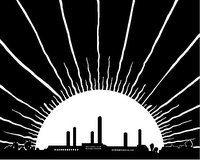Bending the Third Rail
Because We Should, We Can, We Do
Cost of the War in Iraq
(JavaScript Error)
Wednesday, March 22, 2006
Peak Oil Is Coming!, Peak Oil Is Coming!
 Salon has a terrific article in today's issue on peak oil, talking about the Paul Revere's of the peak oil movement.
Salon has a terrific article in today's issue on peak oil, talking about the Paul Revere's of the peak oil movement.The article chronicles the analysis and efforts of those who believe that peak oil is not only imminent, but is going to mean an enormous shift to our society. The predictions range from changes of apocalyptic proportions, to more measured albeit dramatic shifts in how we live life. The scariest part of the article is that some of the individuals who think this, and those who are interviewed are not wild-eyed ex-hippie wackos. These are educated professionals with credentials in the field. In other words, people who should know.
I'm proud to say that many of those interviewed are from my local community. Communities such as Willits, Sebastapol, and Marin/Sonoma Counties in general are actively working toward energy independence in anticipation of peak oil. The city of Sebastopol is actively planning, and positioning itself, for the inevitability of gasoline prices in excess of $10/gal .... in the near future.
It's a very good read for anyone wanting some sense of what peak oil actually means to everyday life.
I'm quite ambivalent on the subject. Not about peak oil, I'm sure peak oil is here. When huge price fluctuations occur simply because a Middle Eastern potentate farts, you know that supply is quite tight. No, my abivalence is on how the scenario plays out. Will technology rescue all of us? Will changes occur gradually enough for the adaptation to take place that allow our economic health to remain robust? Will international relations be a series of wars fought to retain access to an increasingly sparse resource? I just don't know.
These, and many many other questions remain, and no one knows the answers. But being wrong in your estimation of the answers could be disasterous. Which is one of the many reasons I'm really glad to live where I live. While not immune, local civic leaders are taking the initiative now to mitigate the coming changes.
And most importantly?
Food can be grown here ....
Locally:
Friedemann, a systems analyst for a large transportation company. She's been studying the history of agriculture in California and learning sustainable farming techniques.No matter which scenario you subscribe to, it's clear that life is going to get more expensive and access to food may become problematic.
"As energy gets more expensive, food will get more expensive," Friedemann says, citing a stat that's often mentioned in peak-oil circles: In our era of industrial agriculture, it takes 10 calories of fossil-fuel inputs for fertilizers, pesticides, farm equipment and transportation from natural gas, oil and coal to produce one calorie of food.
Time will tell. My biggest concern is apathy. We've known this was coming for 40+ years. It may take further/more/worse crisis to wake folks up to the issue. I think one thing can be said with confidence. It should be quite interesting!
2 Comments:
About Me
- Name: Greyhair
- Location: Wine Country, California
I'm a very lucky person with every allergy known to man but still happy to be enjoying a wonderful life living in the best place in the world!
Blogroll
The Big PictureBillmon
Blah3.com
Born at the Crest of Empire
Eric Alterman
Eschaton
FireDogLake
Feingold's Blog
Dan Froomkin
The Huffington Post
Hullabaloo
The Illustrated Daily Scribble
Jesus General
Juan Cole
Matilda's Advice and Rants
Mia Culpa
MsJan Quilts
Needlenose
The Oil Drum
Political Animal
Political Wire
Spooks of the Ozarks
Talk About Corruption
TalkLeft
Think Progress
War and Peace
The Washington Note
The majority of us are simply stuck. We do little things like switching to compact fluorescents and limiting trips and washing only full loads of clothes or dishes. Mostly, we just sit and watch our 'leaders' clamp their hands over their ears while screaming "We're making progress" to drown us out. If there is any hope at all, it will come at the local levels such as yours.
I'm not overflowing with hope right now.
The only options are to continue with political action in support of those who get it. And believe it or not, lowering your own energy footprint is not only economically and environmentally smart, but it's part of preparation. For example, you will eventually have to buy a car. When you make that investment, do so wisely. Finally, getting yourself in a highly sound financial situation is of paramount importance. For most people, that means sacrificing/changing your standard of living. But again, it's not only sound thinking in the present, but preparation for the future as well.
Not easy. Certainly not fun. But necessary.
One of the few (very few) benefits of being older is that the impact on *you* lessens as you get older. For a 20 year old, peak oil would be critical while for a 70 year old, not so urgent, except in terms of thinking about legacy.